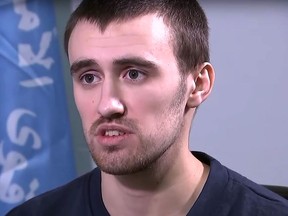An activist working with the family of Jack Letts, an alleged terrorist with Chatham-Kent ties held for six years in Syria, is slamming an Appeal Court decision overturning a ruling ordering Ottawa to help bring him and three other Canadians home.

An activist working with the family of Jack Letts, an alleged terrorist with Chatham-Kent ties held for six years in Syria, is slamming an Appeal Court decision overturning a ruling ordering Ottawa to help bring him and three other Canadians home.
Matthew Behrens, an advocate with the group Stop Canadian Involvement In Torture, has been assisting the Letts family in their efforts.
In a decision released Wednesday, a panel of three Federal Court of Appeal justices found the federal government is not obligated under law to repatriate the men, overturning a January decision by Federal Court Justice Henry Brown.
Brown had directed Ottawa to request the men’s repatriation as soon as reasonably possible and provide them with passports or emergency travel documents. He also ruled the men were entitled to have a federal representative go to Syria to help facilitate their release once their captors agree to hand them over.
The Appeal Court’s decision “ignores Canada’s domestic and international human rights obligation,” Behrens said Thursday, calling it more of a US-style ruling.
Letts, nicknamed “Jihadi Jack” by UK media, was stripped of his UK citizenship by the British government for alleged ties to ISIL. The Oxford-born Letts has Canadian citizenship through his father, who is originally from Chatham-Kent but now lives in England.
Behrens said the Letts family is pondering next steps.
“We’re looking at whether we should be appealing to the Supreme Court of Canada,” he said.
Jack Letts’ father, John Letts, is a Pain Court native, while his mother, Sally Lane, moved to Ottawa after her son was stripped of British citizenship to maintain pressure on the Canadian government.
“The Federal Court of Appeal made a clear choice to perpetuate the arbitrary detention and torture of my son and the other Canadian detainees,” Lane said in a statement.
“The decision is nothing but victim blaming and narrow legalese that stands in utter contempt of human rights law and fails to rise to the challenge of the moment,” she said.
“The Canadian government was able to deploy massive resources to repatriate hundreds of citizens from the middle of the street fighting in Sudan,” she added.
It “makes no sense whatsoever that they cannot bring home four Canadian men who are detained in northeast Syria a short 10-minute walk from the very safe handover location that they have visited repeatedly in prior repatriations of Canadians.
“From the very start, Canada has held the key to their release, and it refuses to unlock the prison doors that the Kurds are willing to hold open for them.”
The Canadians are among many foreign nationals in Syrian camps and jails run by Kurdish forces that reclaimed the strife-torn region from the extremist group Islamic State of Iraq and the Levant (ISIL).
After the January decision, Behrens said the hope was Jack soon would “join his mom in Ottawa.”
The family’s emotions are far different now, he said Thursday.
“It’s really difficult. It’s just one more punch in the gut to Jack’s parents,” Behrens said. “Every time we take a step forward, it’s like the combined forces of these governments and their security agencies tried desperately to slam the door shut again.”
In a previous interview, John Letts said his son became interested in Islam at 15 while studying world religions at school in Oxford, England, where the family then lived.
Jack Letts later converted to Islam and traveled to the Middle East, ending up in Raqqa, the de-facto ISIL capital, before the group’s 2019 defeat.
Letts once said in a TV interview that he formerly saw his native UK as an enemy and might have been willing to take part in a suicide bombing, but became deeply disenchanted with ISIL and eventually escaped Raqqa.
His parents said his opposition to the terrorist group left him in grave danger, and that the TV interview was conducted under the influence of torture by his Kurdish jailers.
With files from The Canadian Press, National Post and Ellwood Shreve

Comments
Postmedia is committed to maintaining a lively but civil forum for discussion and encourages all readers to share their views on our articles. Comments may take up to an hour for moderation before appearing on the site. We ask you to keep your comments relevant and respectful. We have enabled email notifications—you will now receive an email if you receive a reply to your comment, there is an update to a comment thread you follow or if a user you follow comments. Visit our Community Guidelines for more information and details on how to adjust your email settings.
Join the Conversation